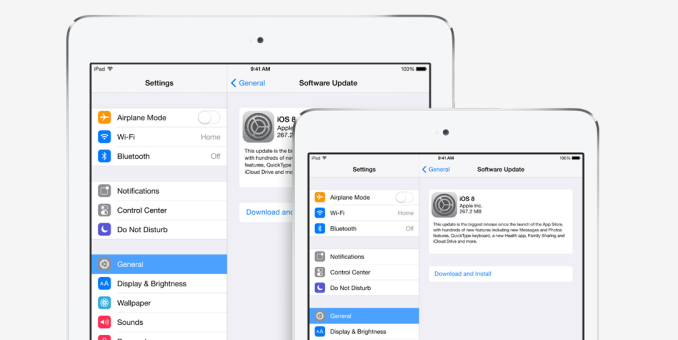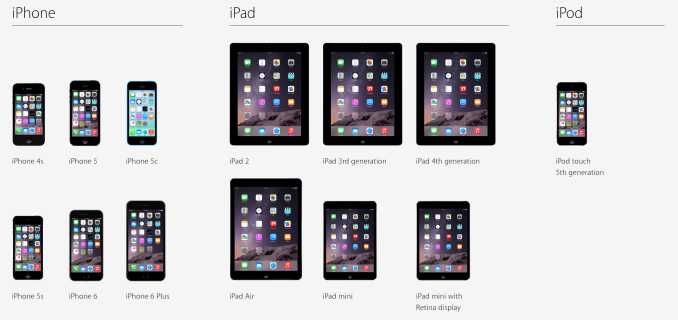The iOS 8 Review
by Brandon Chester on September 17, 2014 1:00 PM ESTIt's hard to express how I feel about iOS 8. On one hand, it's a massive release for developers and those new tools and APIs will eventually translate into better and more functional applications for users. From this point of view, iOS 8 could be considered even more exciting than iOS 7, but from the perspective of a user there's no real wow factor with iOS 8 right now.
There are some great new features like SMS Relay and Handoff, but they require being a user with multiple Apple devices, and the former isn't here yet. That isn't to say that users with only an iPad or an iPhone are left out. The improvements across iOS in apps like Messages and Photos are solid improvements, and features like Actionable Notifications finally address complaints that have existed for years. But a great deal of the additions are currently just a promise that great things are coming from the developer community, and many of the most exciting features that can be used right now are part of continuity.
As someone who does use multiple Apple products, I'm happy with what Apple has brought in iOS 8. I think many of the continuity related features are things that are very hard for another company to replicate without the control over hardware and software that Apple maintains. When I imagine myself as a user who can't take advantage of the new features given to users of multiple devices I believe I would still be pleased with what iOS 8 brings to the table, but not to the degree I was when iOS 7 was released.
Many of the improvements are in areas of the OS that have long needed to be improved or changed. There are also number of additions that take a great amount of inspiration from other mobile operating systems. While this may be seen as copying by some, for users the end result is that their experience is improved and they have features they did not have before, which is what really matters. Apple looking to other operating systems to see what deficiencies they need to fix in their own ultimately benefits users.
iOS 8 runs on all the devices shown above. It's great to see Apple supporting devices like the iPad 2 that launched in 2011, but I'm not without my concerns, primarily regarding Apple's A5 devices and all iPads in general. Even under iOS 7.1, the UI smoothness on devices like the iPhone 4s and the iPad 2 is far from exceptional. That performance doesn't get any better with iOS 8, and I believe that users of those devices may want to try out the iOS 8 experience on someone else's device before upgrading their own.
The iPad concerns in particular are ones I've had since iOS 7 initially launched. For about a year now I've felt that the iPad build of iOS has been neglected by Apple. The Springboard crash bug that took until iOS 7.1 to patch crippled my iPad Mini with Retina Display. If a similar bug had widely affected iPhones I believe it would have been patched much sooner. Other various bugs and performance issues that existed on the iPad but not my iPhone resulted in me eventually selling it. Many of these still remain today, and iOS 8 even introduces some issues of its own.
Given that the iPad 3 I have for testing falls into both the Apple A5(X) camp and the iPad camp, I won't be updating it to iOS 8. While the new features like SMS Relay will be nice, the missing features and issues like keyboard lag outweigh the benefits of updating.
Despite my concerns, iOS 8 makes me feel excited for the future more than anything else. Apple's steps to open up more options for customization by developers and users on iOS marks a significant departure from their previous releases. It's not Android but it isn't meant to be. It brings new features and capabilities that are implemented in a very Apple-like manner, for better or for worse. I don't think it's going to do much to sway Android fans toward iOS, but it gives a lot of reason for current iOS users to stay with Apple. This is especially true for users who can take advantage of continuity. iOS 8 feels like another step in the maturation that began with iOS 7. Most exciting of all is that it's still only the beginning.












164 Comments
View All Comments
SirPerro - Thursday, September 18, 2014 - link
Why? Everybody uses whatsapp now, even iOS users. And no need to contact them in the first place.iMessages would be fine if more than a 10% of the people had it, and if whatsapp didn't exist
samsonjs - Wednesday, September 17, 2014 - link
Everyone I know who uses iOS (i.e. most people that I know) uses the Messages app and thus has and uses iMessage. I don't have to get them to sign up for anything or install an app, I just send them a message the same way I used to send them an SMS and now it uses iMessage and has higher-res photos and all the other goodies that come with it.Why wouldn't I use it?
Ancillas - Wednesday, September 17, 2014 - link
That's the same argument for Android users. Hangouts integrates with SMS, so why wouldn't they use it? The difference is that iMessage isn't an option for Android users, but Hangouts *is* an option for iOS users.steven75 - Wednesday, September 17, 2014 - link
It's a huge difference. Installing an app and creating an account vs neither. Not to mention Google's problems with privacy invasion.Impulses - Wednesday, September 17, 2014 - link
Not really, the only difference lies in that Apple pre installs the app (doesn't Hangouts come with most phones now tho?) AND automatically logs you in with your Apple account which most people blissfully ignore. If Google integrated Hangouts to that degree there'd be a pitchfork mob over it.Impulses - Wednesday, September 17, 2014 - link
I know you meant that comment as an iPhone user and Hangouts would never be pre-installed, but you're basically assuming everyone should use an iPhone if your argument is his revolve around that single point.WinterCharm - Wednesday, September 17, 2014 - link
Wrong again. The difference is that apples app is the only messaging app installed and it seamlessly switches between SMS and iMessage WITHIN the same app. It's not about having the app installed. It's about seamless integration.grayson_carr - Wednesday, September 17, 2014 - link
Um, actually you are wrong again. On Nexus Android phones, Hangouts is the only messaging app installed and it seamlessly switches between SMS and Hangout messages WITHIN the same app. Some Android manufacturers include their own messaging app as well, but Hangouts is ALWAYS included on Android phones and seamlessly integrates with SMS on any Android phone, within the Hangouts app.Impulses - Thursday, September 18, 2014 - link
Hangouts can do that too, within Hangouts, iMessage just happens to come preloaded and Apple pre logs you in. If Microsoft pre logged you into an Outlook account on a Windows PC the EU would have their ass, but Apple can get away with it.retrospooty - Wednesday, September 17, 2014 - link
Exactly the same. You haven't used hangouts have you? because you dont seem to know it works EXACTLY the same as iMessage, only universally.